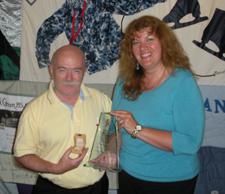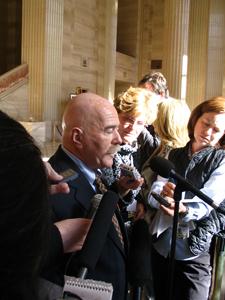
BLING. McNutt recieves the CAS leadership award Jun 19. Credit: Neil McKinnon
On Jun 19, the Canadian AIDS Society presented their annual leadership award to Albert McNutt, a Nova Scotia-based gay activist.
McNutt, 59, has been HIV-positive since 1986. This isn’t the first time he’s been recognized for his work by the HIV/AIDS community. He is best known for his fight against the Canadian government for Canada Pension Plan Survivor Benefits — a case he took all the way to the Supreme Court of Canada as a member of the so-called Hislop class. There he and others won a partial victory that secured pension benefits for same-sex widows in the future, but limited the back-pay owed to survivors like McNutt. For that, he won an award with the Canadian HIV/AIDS Legal Network.
“[AIDS activists] don’t often get acknowledged for what we do,” says McNutt, who started that Northern AIDS Connection Society of Nova Scotia out of his dining room in 1996.
McNutt hails from Truro, Nova Scotia, a town with a population of 12,500 people.
“I saw a need to put a face to HIV. People often wonder what it’s like living with it,” says McNutt.
One of the biggest challenges in educating people about HIV/AIDS is stigma, says McNutt, and it’s an issue that the Northern AIDS Connection Society tackles head-on.
“When you look at HIV, it’s been put into a category with marginalized groups — gay men, drug users, sex trade workers and Aboriginal people. They’re not saying it’s affecting lawyers on Bat St. Mainstream society is starting to believe that if you don’t fit into one of those groups, you can’t get the disease. HIV doesn’t care if you’re gay or straight, male or female, black or white, rich or poor.
“Back when I was diagnosed, it was considered a death sentence. You were supposed to be dead within a year. Nowadays, HIV is classified as a chronic, manageable disease. We have to look at those issues through education and awareness programs,” says McNutt.
Monique Doolittle-Romas, director of CAS, says more people need to be recognized for their hard work in the HIV/AIDS movement.
“Al’s award is well-deserved. He’s done a lot of work and been a mentor to a lot of people. People like him are in the front line. They deliver services, treatment support. There were the first ones to respond in the early epidemic and they’re now continuing to deliver critical services,” says Doolittle-Romas.

 Why you can trust Xtra
Why you can trust Xtra


